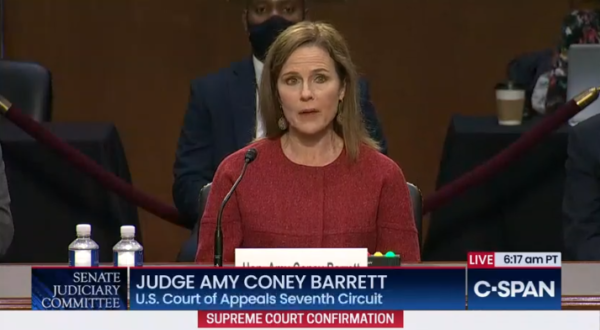
As the Senate Judiciary Committee started grilling Judge Amy Coney Barrett Tuesday, Fox News was reporting that murders in Chicago have jumped more than 200 over the same period last year, and there are still more than two full months before the year ends.
Fox referred to Chicago Police Department data as of Oct. 4 that listed 596 homicides, but since that time, there have been more slayings and the Chicago Tribune is now reporting 605 slayings.
According to WMAQ News, this past weekend saw four more murders and at least 41 people were wounded in the Windy City. The murder total in Chicago, as Liberty Park Press has previously reported, exceeds that of most entire states. Only a handful of states post more annual murders than just Chicago.
This suggests guns are not the problem, but people misusing them are.
Chicago police data says there were 397 murders in the city last year. In 2018, Chicago logged 446 killings. During the previous year, Chicago posted 530 homicides and in 2016, there were 565 slayings.
That puts Chicago already ahead of the past four years in terms of body count.
By no small coincidence, Sen. Dick Durbin (D-IL) challenged Judge Barrett’s reasoning in her dissent in the case of Kanter v. Barr, a Second Amendment case in which Kanter, a convicted felon, contended his crime shouldn’t disqualify him from owning a firearm. Chicago is in the Seventh Circuit, and Judge Barrett sits on that circuit.
Durbin intimated Judge Barrett might have a wrong view of the right to keep and bear arms, and about denying that right forever to convicted felons.
Subsequently, Sen. Mike Lee (R-UT) came to her aid, allowing her the opportunity to explain her position.
In her dissent in the Kanter case, Judge Barrett wrote, “While scholars have not identified eighteenth or nineteenth century laws depriving felons of the right to bear arms, history does show that felons could be disqualified from exercising certain rights—like the rights to vote and serve on juries—because these rights belonged only to virtuous citizens.”
What may be wrong is how Chicago seems to be home to lots of people with criminal histories, yet they still get their hands on firearms. Durbin suggested neighboring Indiana is the source of firearms to these outlaws, and seemed to suggest that Barrett’s dissent in Kanter might protect such people when they obtain firearms. She responded that nowhere in her dissent did she advocate for re-arming felons. Instead, here is the opening paragraph of that dissent:
“History is consistent with common sense: it demonstrates that legislatures have the power to prohibit dangerous people from possessing guns. But that power extends only to people who are dangerous. Founding-era legislatures did not strip felons of the right to bear arms simply because of their status as felons. Nor have the parties introduced any evidence that founding-era legislatures imposed virtue-based restrictions on the right; such restrictions applied to civic rights like voting and jury service, not to individual rights like the right to possess a gun. In 1791—and for well more than a century afterward— legislatures disqualified categories of people from the right to bear arms only when they judged that doing so was necessary to protect the public safety.”
However, in the next paragraph, Judge Barrett wrote, “Neither Wisconsin nor the United States has introduced data sufficient to show that disarming all nonviolent felons substantially advances its interest in keeping the public safe. Nor have they otherwise demonstrated that Kanter himself shows a proclivity for violence. Absent evidence that he either belongs to a dangerous category or bears individual markers of risk, permanently disqualifying Kanter from possessing a gun violates the Second Amendment.”
Kanter was convicted of mail fraud. Armed thugs in Chicago might have more serious and violent criminal histories logically disqualifying them of Second Amendment rights forever, yet they still get their hands on guns.
Lately, they seem to be a pretty busy bunch.
Gun control advocates have been concerned that Judge Barrett could provide a solid conservative majority that will open the door to more gun cases being accepted for review by the high court. Under questioning from Sen. Lindsey Graham (R-SC), Judge Barrett acknowledged that her family owns a firearm. Being a gun owner, however, would not sway her performance in deciding gun-related cases.